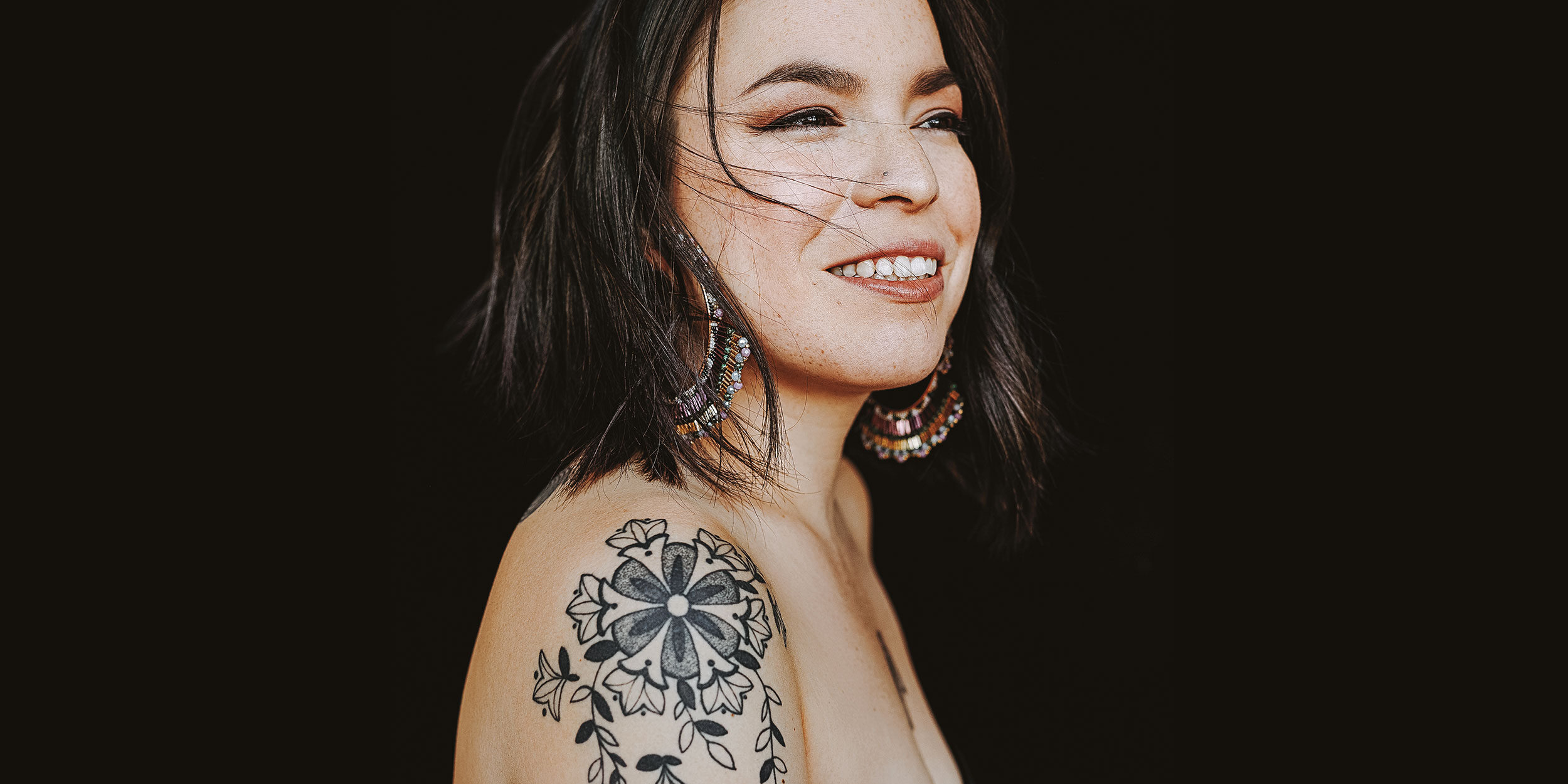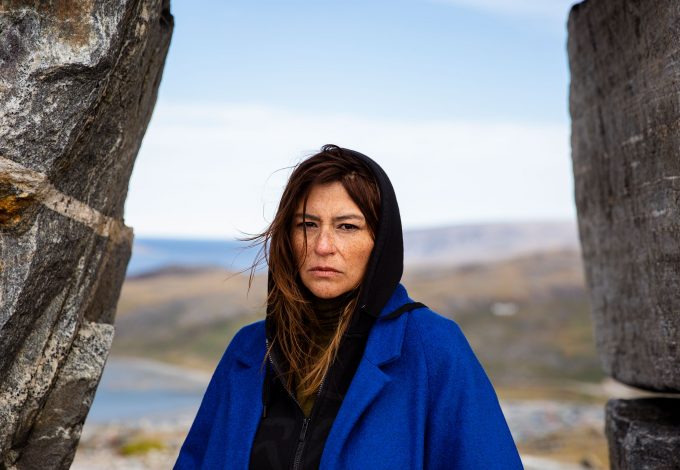THE EMERGENCE OF CHANGE — Women of influence, women of action, radical women, caring women. The start of the new decade has already seen several debates, and political life has been no exception. However, the ascension of figures in search of a better world, who want to raise awareness of injustices, has not gone unnoticed. The political landscape is gradually becoming more inclusive. Structures are being reshaped and change is emerging. What are the faces that marked the year 2020? Let’s shine a spotlight on the place of women of power on the global political scene.
NATASHA KANAPÉ FONTAINE
Indigenous activist, writer, and actress
Considered the unofficial spokeswoman of her community, Natasha Kanapé Fontaine is part of the Innu community of Pessamit. An Indigenous rights activist, she represents the Idle No More movement to share a message of openness and humanity across the country through conferences. Her mission is to open a dialogue allowing us to better understand and honour each other’s differences in order to cultivate respect. Seeking to unite those from different peoples, she is the symbol of an activist message of peace. With the help of poetry, conferences, and public appearances, she offers her voice to the voiceless.
“I am a wounded America that has forgotten its birth name: everywhere the lie of conquest, everywhere arrogance, everywhere the obsession with being the winner.”
— Natasha Kanapé Fontaine, the poem “Cry” from her collection, Do Not Enter My Soul in Your Shoes, 2012
JACINDA ARDERN
Prime Minister of New Zealand
Elected prime minister in 2017, she was recognized as the third woman to occupy this role in New Zealand. In addition to giving birth to her second child during her term, she stands out in particular through the way she has handled the various crises that have shaken her country. Described as too soft upon taking office, she has proven her adversaries wrong by combining caring, firmness, and leadership after the Christchurch massacre and the White Island eruption. Since the spring of 2020, people around the world have been talking about her for the judgment she has shown in managing the coronavirus crisis, becoming one of the most influential political personalities in the world. By taking rigorous action in advance, New Zealand has succeeded in stopping the spread of the virus, positioning itself as one of the first countries in the world to return to normal life so quickly.
“I would call it an active government. At the moment, people are not feeling the benefits of any form of prosperity; wages aren’t keeping up with inflation; the cost of housing is outstripping most people’s reach. And what is the point of economic growth when we have some of the worst homelessness in the developed world? Our plan is to be an active government focused on ensuring people have decent jobs, decent housing, and hope for the future.”
— Jacinda Ardern, about her government
ALICIA GARZA
African-American activist and columnist
The co-founder of the Black Lives Matter movement, Alicia Garza is a queer activist involved in the fight against racism and working for the rights of LGBT+ (lesbian, gay, bisexual, transgender, and intersex) people. She has emphasized the power of perseverance in the fight against injustice since 2013, when George Zimmerman was acquitted after shooting and killing a young, unarmed 17-year-old Black man named Trayvon Martin. Calling for mobilization in response to the verdict, she shared the following post on her Facebook page: “Black people. I love you. I love us. Our lives matter. Black lives matter.” Two other activists, Opal Tometi and Patrisse Cullors, joined the call to action. Cullors then added the #BlackLivesMatter hashtag. Garza’s phrase catalyzed a national —then international—movement against racial injustice. Seven years later, the hashtag is shared extensively on social media, and protests are erupting around the world. Garza also works for the National Domestic Workers Alliance, in addition to being a director of the Black Futures Lab (an organization dedicated to building political power for Black people). Awarded the Sydney Peace Prize in 2017, her work is recognized through her editorials, which have been published in renowned magazines (The Guardian, The Nation, HuffPost, and Rolling Stone). Above all, she wants to make the public aware of how police violence goes beyond the borders of race, sexual orientation, and gender identity. She also wants to empower women by teaching them to belong, take risks, and always rely on integrity.
“For us, #BlackLivesMatter is really a re-humanization project. It’s a way for us to love each other
again, to love ourselves, and to project that love into the world so that we can transform it.”
— Alicia Garza, about the Black Lives Matter movement
SANNA MIRELLA MARIN
Prime Minister of Finland
Elected in 2019 at the age of 34, Sanna Mirella Marin is the youngest prime minister in the world, working at the head of a coalition led by five women, four of whom are under the age of 35. This is the most female government in the world, represented by twelve women and eight men. Finland has always been ahead of the curve. In 1906, the country was the first to grant women the right to vote. At present, it has almost equal representation in parliament. For Sanna Marin, there is still a way to go in terms of equity and equality. The prime minister wants to tackle the issues of equality in the labour market and domestic violence. She mentions that, in Finland, many young women still suffer physical or sexual violence. Raised in a “rainbow” family by her mother and her female partner, she grew up in a modest environment oscillating between poverty and the inability to open up to others about her family situation. There, she discovered the importance of justice, equality, and human rights—values particularly conveyed through her political career. Sanna is the first person in her family to attend university. With her progressive profile, her unconventional journey, and her feminist and ecological convictions, she is the symbol of a new generation and pioneering when it comes to the representation of women in politics.
“I never thought about my age or gender. I think of the reasons I got into politics and those things for which we have won the trust of the electorate.”
— Sanna Mirella Marin, in response to criticisms that have been made about her
ALEXANDRIA OCASIO-CORTEZ
American politician
Recognized for being the youngest candidate ever elected to the United States Congress, Alexandria Ocasio-Cortez represents New York’s 14th congressional district. Supporting Indigenous communities and middle-class people to the detriment of big business interests, she is a model in terms of defending social, racial, economic, and environmental justice. She advocates for inclusion, especially in the fight for LGBT+ rights, denouncing discrimination against marginalized groups. In the summer of 2020, shortly after the wave of denunciations against sexual harassment, Ocasio-Cortez was the victim of verbal abuse in Congress. She then pointed a finger at a global cultural problem where violence—particularly violent and dehumanizing language against women—is accepted. The event sparked reactions in the media, and a few days later, we witnessed a wave of female solidarity on social media. Not worried about being the only dissenting voice, she discusses problems that her adversaries try to sweep under the rug, such as sexism, police violence, corruption, and the climate crisis.
“Change takes courage.”
— Alexandria Ocasio-Cortez, about the environment
In June 2019, Alexandria Ocasio-Cortez and Greta Thunberg came together to highlight the importance of tackling climate change and to discuss tactics that really work as activists.
“Hope is not something that you have. Hope is something that you create, with your actions. Hope can be contagious. Other people start acting in a way that has more hope.”
“We need to start communicating. This is a global struggle. It’s not about what is Sweden doing and what is the US doing. It’s about what are all of us doing, as one movement.”
— Alexandria Ocasio-Cortez, about the environment – in collaboration with Greta Thunberg





